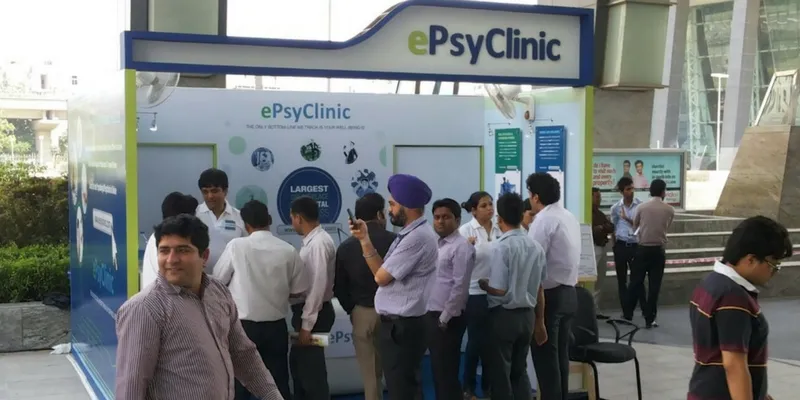The woman who founded India’s first online mental health portal on why talking is important
With more than 7 million Indians affected by depression and 36 percent likely to suffer a mental health ailment at some point in their lives, Shipra Dawar’s ePsyClinic is promoting the discourse around mental wellness.
Depression hit Shipra Dawar when she went to Australia for higher education; the loneliness and difficulty in adjusting to a new environment away from home led to mood disorders. But naturally, this was noticed by people around her. When a professor at the university she was doing her MBA at recommended that she see a therapist, she was irked. For like most people, she was in denial about being in depression.

Owing to lack of awareness and knowledge, mental illnesses have been spreading in India. Like Shipra, lakhs of Indians have suffered or have been suffering from depression for years, maybe decades. But they choose to keep it under wraps.
Things have changed somewhat since actress Deepika Padukone spoke about her battle with depression, and said her phase was "a bad experience" and that she constantly fears a relapse.
Platform to promote mental wellness
But a lot more needs to be done to get rid of the stigmas attached to depression and mental health issues. Shipra is working towards that with ePsyClinic, an online platform where people who need help can text chat, audio chat, or video chat with psychiatrists or psychologists.
Shipra was born in Chandigarh and her father was a banker. Like every other banker’s family, Shipra’s also moved around the country due to the regular transfers. Her father was involved with community service and helped women’s help groups. Shipra inherited his traits, and was keen to work for the welfare of people; right now, 80 per cent of the workforce at ePsyClinic is women.
Shipra attended Australian National University where she did her bachelor's and also her MBA in Leadership and International Strategy. With a strong urge to make healthcare services not a luxury for a significant few but accessible to anyone and everyone, she founded ePsyClinic in 2015 to address the mental and emotional wellness issues of the people in the country. She bootstrapped the company with some funds from friends and family.
Based out of Gurgaon, the company acquired its first set of customers through virtual clinics they set up in malls and corporate offices across Delhi and Gurgaon. They encouraged customers to speak about mental health issues at work places and shopping areas, working to reduce the stigma and ensuring that mental health issues were not treated as abnormal.
Tailor-made therapy
ePsyClinic now claims that through the IWill therapy app which was launched in June 2017, more than 1.5 million unique visitors each month, with over 500 people seeking help every day on its platform and 30,000 registered users on the IWill therapy app. The therapy is tailor-made for each person’s unique needs after an automated algorithm-based assessment tests the mental health concerns. The app pairs the person with the best therapist for them through the pool and also creates a session plan automatically. The price for this session plan may vary from Rs 2,880 to Rs 9,900.
The startup has more than 45 in-house therapists and counsellors and more than a 1,000 of them through extended networks. So far, more than a lakh sessions have been delivered offline and above 3,500 were delivered through the IWill therapy app.

The most common cases at ePsyClinic relate to depression, anxiety, marital and couple therapy, premarital therapy, bipolar disorder, and other mental health disorders.
Training and therapy modules
Speaking to YourStory, Shipra said that her revenue model is purely based on the therapy programme and recovery. She adds that there has been a month-on-month growth of 20 percent since June 2017 in revenues – this is organic and without any significant investments in marketing.
She said,
"The biggest challenge was to build an online therapy science from ground up because there were no white papers. The company developed copyrighted and proprietary training and therapy programmes to ensure recovery in online modes as well as chat therapy and phone therapy protocols. We used of neuro-linguistic programming (NLP) to enable diagnosis and smoother delivery of therapy."
Other challenges included educating and convincing customers that recovery is possible from mental health issues.
Building awareness
"There was no conversation on the topic of mental health when we , at ePsyClinic, started, so building the market from the ground up, educating, building awareness, and ensuring that online therapy does provide recovery have been challenges," she said.
Talking about the competition in the market, Shipra said it is essential to focus on the cause and the bigger picture, and consequently spread awareness about mental health issues. She believes it is imperative that the market players "come together and help the market evolve and reach out to as many people as possible”.

Shipra said that the community she had facilitated is stigma-free and the same exercise now needs to be replicated.
"There is no doubt that there is stigma, but more than that there is also a sense of cynicism and lack of clarity in people about the success rate of mental health services. We have to do a lot of work as a country to educate people about how just ‘talking’ would help. The concept of therapy is not understood yet," she said.
Working through the challenges
Initially, Shipra believed that the world would rally behind her vision, that she would find success as soon as she started. But she found herself facing a different reality, and had to work incredibly hard on each front for the last two years to reach where she is today.
Talking about her struggles and lessons, Shipra said,
"Each day I faced defeats and each day I picked up the small wins to motivate myself and keep progressing. It is a journey of struggles; one gets bruised but if there is a strong faith in one’s abilities and the cause, then one starts loving these scars and struggles. That love for scars and struggles is what ensures success. All women and men entrepreneurs preparing to bring in energy and creativity through their products must remember that it’s you, not your product, that will make your startup successful. No matter what, don’t give up. If you really believe, you will make it. Just stay the course."
In the future, Shipra and ePsyClinic are looking to enhance the IWill therapy app with more automation, for control in subsequent releases. . The company now plans to raise seed funding for scaling the IWill Therapy app. They are also planning more additions in treatment modules and a remote psychiatry module for rural India.







